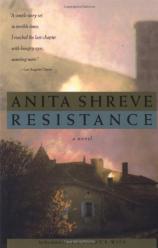Reading Group Guide
Discussion Questions
Resistance

1. Resistance captures the life of a community under brutal foreign occupation. Some people actively resist; many others sympathize with the resistance; and other cooperate with the occupiers. Discuss the various reactions of some of the key characters. Does this extreme experience reveal each person's true character? Or does it transform them in some ways?
2. Claire observes, "It was odd...how perfectly ordinary people, people who might not have amounted to much, people one hadn't even noticed or liked, had been transformed by the war" (page 79). What does she witness in her colleagues? How has she herself changed, if at all?
3. The young boy, Jean, takes a huge risk when he tries to search for and rescue a wounded soldier. He even goes as far as withholding information from his father, who is a collaborator. Why does he take it upon himself to help save the American?
4. Jean and Ted have very little direct contact, yet they somehow forge a strong connection in their brief acquaintance. How does each influence the other? Describe their relationship.
5. When the Gestapo gathers the prisoners for their punishment, why does Jean record the names of the captured villagers? How does this relate to his future role in the fiftieth anniversary?
6. Claire always knows the beginnings of the refugees' stories but never their endings. How does Ted's arrival change these circumstances?
7. As their love for each other grows, Ted and Claire are faced with a choice: to ignore their desires or give in to them. Discuss their decision. Was it morally justifiable? How do they cope with their choice?
8. Lieutenant Ted Brice is one of the best fighter pilots. Yet he doesn't expect to fly another plane after the war. In fact, he refers to flying as "a kind of engineering job." Why does he use that particular analogy? What does he envision to be the war's effect on flying?
9. The impersonality of the war plays an unmistakable role in the story. Ted notes that before being shot down, "he had not truly understood the ugliness that was at the core of this war" (page 149). What does Ted learn from his experiences in the war? How do his views change in the course of the book?
10. Ted relates to Claire a training scenario in which a jeep carrying a flight crew and a bus full of schoolchildren are headed for a collision on a one-lane road; one or the other must crash off a cliff. Her response is revealing. Analyze Claire's reasoning.
11. Ted and Claire know that in times of war the threat of betrayal can come from all sides and in any form. Yet they manage to work around the risk for some time. Had they met in different circumstances, do you think Ted and Claire would have had the same emotions for each other?
12. Languages play a key role in this novel. How does language help or hinder the course of events?
13. At the novel's end, we jump ahead to 1993, the fiftieth anniversary and the contemporary meeting of Ted's son and Claire. What does this framing story add to the novel? Was the conclusion satisfying?
14. Do you think Ted should have returned to Belgium after the war? Why does he choose not to find Claire?
15. Why do you think the author chose to call this novel Resistance? Does the title work on more than one level?
Resistance
- Publication Date: January 1, 1997
- Paperback: 222 pages
- Publisher: Back Bay Books
- ISBN-10: 0316789844
- ISBN-13: 9780316789844








